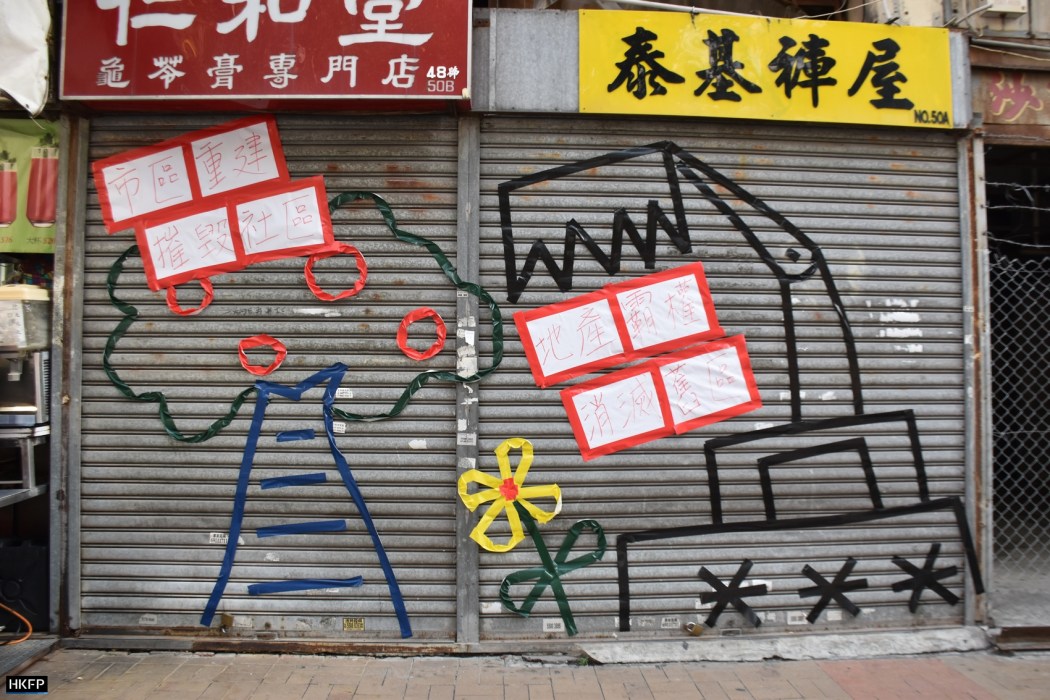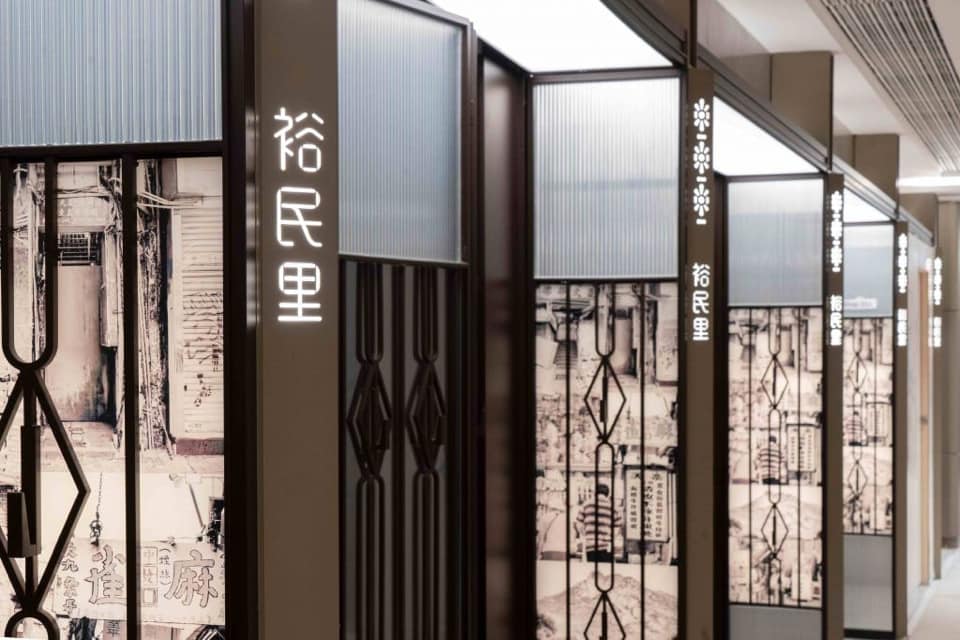“It was my father’s last wish for me to inherit the store,” says Mr. Hui, the owner of On Kee Leather Goods, one of the last remaining stores in Yue Man Square, Kwun Tong.
Hui is one of just three remaining merchants and two tradesman in the square, after it was scheduled for redevelopment.

Unveiled in 2007, the Kwun Tong Redevelopment Plan, which covers a total area of around 400 thousand square metres, is the largest such plan ever mapped out by the Urban Renewal Authority (URA).
Since its launch, the scheme has faced much criticism despite the government and URA hailing it as a success. It envisions a new shopping mall and public transport hub which are due to open in April. About a dozen merchants in Yue Man Square will relocate to the mall.
Hui and the others were considered to be occupants of illegal structures in Yue Man Square, and – on March 2 – they were notified by bailiffs that their stores would be cleared out at the end of the month. But uncertainty still surrounds what will become of their businesses following the last phase of demolitions which began in February.

Yuen Chi-yan, founder of Living in Kwun Tong, a community group that focuses on conservation issues in the district, said that the redevelopment plan amounts to “government-led gentrification.”
Yuen said the area forms a rich part of Hong Kong’s historical heritage: “Kwun Tong was a working class community and was once the largest industrial area in Hong Kong… red van, a Hong Kong icon, also started out in Kwun Tong.”
The founder said the redevelopment plan went ahead without meaningful consultation, and that most merchants wanted to stay in the area.
“To a lot of them, compensation is the last resort…but it felt like the government was only informing us of their plans, instead of actually listening to our opinions.”
Yuen said that businesses occupying Yue Man Square were often faced with an “all or nothing” situation: either relocate to YM², the new shopping mall, or keep fighting and risk not receiving any compensation.
‘Non-options’
On Kee was established in 1968, and Hui took over around ten years ago when his father passed away. According to Hui, his father bought the shopfront when he opened the business more than half a century ago.

The URA had allocated HK$100 million to compensate 106 people, an average of around HK$943,000 per person. According to the URA, tenants of Yue Man Lane will enjoy a six-month, rent-free period followed by a three-year period at a discounted rental rate.
Hui described the choices offered by the URA as “non-options.” The URA told local media that the authority has reserved HK$13 million for the remaining merchants, averaging to around HK$3 million per store, but Hui said that the URA has yet to inform him of the compensation amount. He could also choose to be relocated in Yue Man Lane, part of YM².
However, Hui said that he would not be able to afford the rent and renovation cost in the mall, and that even at a discounted rate, he would have to pay more than HK$20,000 a month in rent along with the initial construction fees.
“Some who chose to relocate to the mall told me that the construction fees would amount to at least several hundred thousands of dollars, and the store has to match the style of the mall, very grand and beautiful,” he said.

“But we’re not selling expensive stuff…” Hui added. “We’re not going in there to sell gold and diamonds…we’re only selling things for the neighbourhood.”
The businessman said that on average he would have to pay more than HK$10,000 per month to cover renovation fees, and he could not be sure that business would be the same.
“There’s a difference in foot traffic between a shop in the mall and a storefront,” said Hui. “I don’t even know how many of my regular customers will bother to come and find me if I move to the mall, they won’t know where I am.”
Hui said that he wanted the URA to offer him another storefront in Kwun Tong but described the negotiations as futile.
“They kept on making the same offer, how is that a negotiation?” he asked.

Yuen said that while the URA initially promised “building in exchange for building,” where store or flat owners would be given another property in exchange for their current location, unit owners often had to pay extra on top of giving up their property for the new unit.
‘Compassionate policy grounds’
Yuen said that apart from shop owners, some tradesmen in Kwun Tong were also facing relocation difficulties.

Mr. Shir, who moved Ming Fai Watch to Kwun Tong more than a decade ago, said all he wanted was to be given a tradesman licence so that he could move to the Yue Man Hawker Bazaar.
Shir was about to receive a licence in 2009, but missed the chance as he had to go to the mainland to see a doctor with his wife when she fell ill.
“I’ve been pushing my cart of the streets for over a decade now, I’m getting old and it’s getting more tiring,” said Shir. “All I want is to make a living.”
The 73-year-old clocksmith will not be eligible to move into the bazaar without the licence, adding that in the period since the government contacted him to confirm his identity last year, the process has stalled.

Shir said he met with the assistant of then director of Food and Environmental Hygiene Department, Vivian Lau, but nothing had come of it.
At a meeting on Tuesday, Kwun Tong district council urged the department to issue him with a licence, but Shir said that no one had contacted him since.
“My wife passed away over a decade ago and I still have a son who is in secondary school,” he said.
“They should issue a licence to me on compassionate policy grounds, I will pay a licence fee and the government can earn an income from that, and I wouldn’t have to get comprehensive social security assistance, and I can also help citizens.”

However, even when hawkers were relocated, community group leader Yuen said it does not guarantee that they could continue to make a living.
“Tung Yan Street Interim Hawker Bazaar has a vacancy rate of 60 per cent,” said Yuen.
The bazaar was offered as an interim option for hawkers in Kwun Tong to relocate to in 2014 before the construction of the new shopping mall was completed.
“A lot of people would rather retire or quit,” said Yuen.
He added that the Tung Yan Street bazaar had narrow paths and bad ventilation, problems which partially led to the high vacancy rate.
Yuen said that a lot of hawkers were also concerned about business in the Yue Man Hawker Bazaar, which is located underground.
Last memory
Mrs. Cheung, owner of Yue Fat Fresh Juice, said that the store was all she had left after her husband passed away in 2009. The 70-year-old said that she often worked until midnight to avoid feeling lonely.

Cheung married and moved to Hong Kong from Taiwan in the 1970s. Her husband opened Yue Fat in Kwun Tong a decade prior to that.
Cheung said she suggested her husband to start selling fresh juice instead of clothes after she moved to Hong Kong, and Yue Fat became one of the first Taiwan-style juice stores in Hong Kong.
According to Cheung, the only option URA gave was for her to move to Yue Man Lane. However, apart from not being able to afford rent, Cheung said that she wanted to hold on to the last memory she shared with her husband.
“Sometimes youngsters with nowhere to go will sit in my store late at night, and we would chat,” said Cheung. “Where would they go if I leave?”

Yuen said the redevelopment plan had ignored the need to preserve local culture and public spaces.
“You can see the establishment of a set of sub-par public facilities,” said Yuen. “People will have to go through a private mall before they can get to the bus station or the park.”
As Kwun Tong is the poorest district in Hong Kong with a large elderly population – Yuen described the redevelopment plan as “a form of discrimination.”
“You’d have to dress fairly decently to walk into these malls to access the public space and facilities, and it would make people feel uncomfortable.”

“What we have treasured in Hong Kong over the last century is diversity,” said Yuen. “Not only in terms of race or political views, but also in terms of class.
“But we can see that this kind of redevelopment and the direction of development is making the diversity we treasure disappear,” said Yuen. “And under gentrification, a group of people is sacrificed, including working class and grassroot people.”
When asked what their plan was if bailiffs clear out their stores in a week’s time, both Cheung and Hui said: “they will have to carry me away.”
Support HKFP | Policies & Ethics | Error/typo? | Contact Us | Newsletter | Transparency & Annual Report | Apps
Help safeguard press freedom & keep HKFP free for all readers by supporting our team

LATEST FROM HKFP
HKFP has an impartial stance, transparent funding, and balanced coverage guided by an Ethics Code and Corrections Policy.
Support press freedom & help us surpass 1,000 monthly Patrons: 100% independent, governed by an ethics code & not-for-profit.










